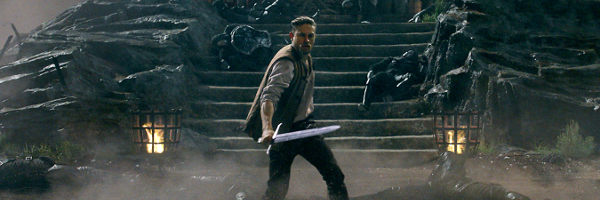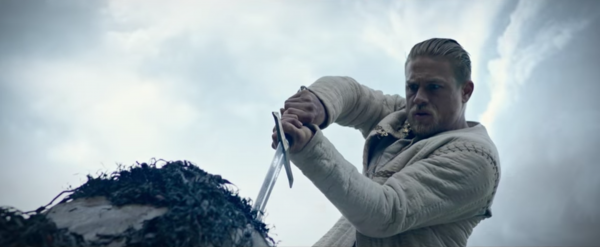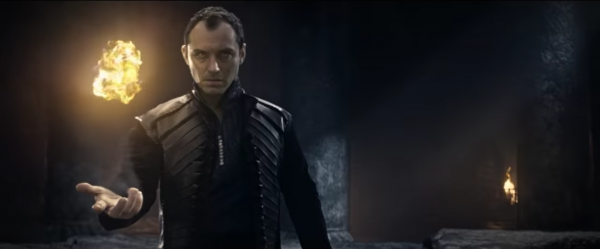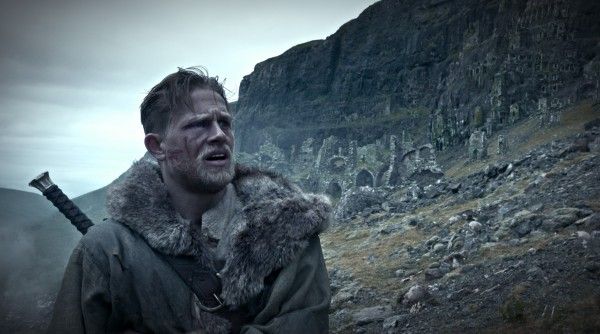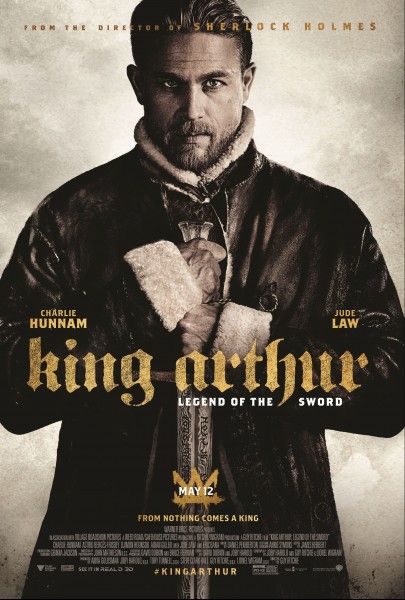The prologue of King Arthur: Legend of the Sword seems like a remnant of a film Guy Ritchie didn’t want to make. It’s got Arthur’s father (Eric Bana) wielding a magic sword against a dark wizard, and while that sounds awesome, Ritchie’s film doesn’t really come alive until after the opening credits when the director seems far more comfortable telling his story at ground level. King Arthur is like three movies smashed into one—a big, Lord of the Rings style epic, a film making fun of that epic, and street-level rebels story—and you can’t help but feel that if Ritchie had a clearer vision for what he wanted, Legend of the Sword would be much stronger. As it stands, it’s sporadically enjoyable for tearing down fantasy tropes and playing to its director’s strengths, but the film can never escape its blockbuster trappings.
After Arthur’s nefarious uncle Vortigern (Jude Law) kills his father to steal the throne, the young king goes into hiding and is raised in a brothel. In an impressive montage that shows the rise of both Vortigern and Arthur, we see Vortigern amassing power and Arthur learning how to survive on the streets. When his father’s sword is uncovered and Arthur (Charlie Hunnam) is forced to reveal himself by pulling it from the stone, he goes on the run with a band of rebels comprised of friends Wet Stick (Kingsley Ben-Adair) and Back Lack (Neil Maskell), his father’s former allies Bedivere (Djimon Hounsou) and Goose Fat Bill (Aidan Gillen), and The Mage (Astrid Berges-Frisbey). Arthur must learn how to control the sword and take down Vortigern before the evil king can finish building a tower that will cement his magical power.
King Arthur: Legend of the Sword is a frustrating film because there are so many brilliant little flashes along the way. When Arthur and his mates are relating a story of how they got some payback against a group of Viking travelers, Ritchie jumps back and forth in time, keeping the storytelling rhythm he’s shown in his previous movies. This ground-level conversation between ruffians and authority figures is where Ritchie is most at home, and he really leans into these scenes where he gets to play with time, conversations, and attitude.
Where the film is far less comfortable is in the mythology the Arthur story requires. On the one hand, the movie always traffics in the mystical, pointing out that the entire conflict began because of a war between men and mages. It’s also a movie with giant, wizard-controlled elephants, gigantic snakes, and other supernatural material, so it’s not like Ritchie wants to dwell in gritty realism like 2004’s King Arthur. However, he never seems completely at ease with the VFX-driven feature. Whenever the movie has to go mystical, Ritchie is either mocking it at best or going through the motions at worst.
It’s clear that the film has gone through some heavy revisions, and that some aspects had to be jettisoned as the story continued to get more focused on being an origin tale for Arthur. You can see it in the prologue where Vortigern appears far more conflicted about his actions but then spends the rest of the movie being a one-dimensional villain and a character far beneath Law’s acting ability. Rather than give the antagonist some complexity, the movie is always hammering Arthur’s journey and trying to explain why he would be a good leader. Sadly, it never really finds an answer to that question.
There are aspects about Arthur that are appealing—he’s sharp, he supports his friends, and he’s got the street smart sensibility present in most of Ritchie’s protagonists. But what makes Arthur special is simply his relationship to the sword. To the film’s great credit, King Arthur: Legend of the Sword makes the sword more than just a super-powered weapon (although when Arthur wields it, you keep expecting a combo meter to pop up in the right-hand corner of the screen). The sword is a symbol for Arthur’s trauma at watching his parents’ death at the hands of Vortigern, so he can’t become stronger until he faces and accepts that trauma. For a film that could have eschewed metaphor entirely, it’s nice to see a hero wrestle with something relatable rather than something supernatural.
For Ritchie’s part, whenever the supernatural does appear, he handles it haphazardly. There are times, like when Arthur goes to the “Darklands” to learn how to master the sword, that the director has fun with the premise, and plays a quest in fast forward. But there are also times when the movie gets away from him completely to where there doesn’t seem to be any rhyme or reason to how magic functions in Legend of the Sword. At one point, a massive snake comes in and kills a room full of people, and we’re left to wonder why the snake didn’t just kill Vortigern. Can the snake kill Vortigern? Why didn’t they use the snake before?
King Arthur: Legend of the Sword is a bit of a hodgepodge, but it’s one that’s consistently interesting. It makes missteps and there are bits that absolutely don’t work, but it surprisingly succeeds more often than it fails. It makes me wish the movie was a bit tighter and more focused because I’d like to see Ritchie tackle other aspects of this world, especially since Legend of the Sword has the restraint to not force in other elements of Arthurian myth like Lancelot, Guinevere, etc. The irony of King Arthur: Legend of the Sword is that everything that pushes it towards being a blockbuster franchise is the stuff that will ultimately stop it from becoming one.
Rating: C+

